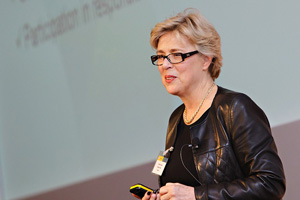Egg processing discussions close off IEC conference

IEC Business Conference Vienna 2014 came a close on Tuesday, as the conference sessions focused delegates’ attention on business analysis and egg processing.
Danielle Cagan, European Lead Buyer for Nestlé, addressed IEC delegates during the Egg Processing session; she provided delegates with thought provoking insights from the world’s largest food processor and manufacturer. Nestlé employs 333,000 people worldwide; it has 461 factories in 83 countries and a revenue of 93 billion Swiss Francs. Eggs, and egg products in particular, play a significant role in Nestlé’s product offering.
Cagan spoke in detail about supply chain integrity and the importance of transparency and traceability to create and maintain consumer trust. She stressed to the IEC the need for her suppliers to demonstrate excellent control of their product supply, both in terms of production levels and price. She outlined the company’s expectations towards egg products in Europe, she spoke about Nestlé’s Supplier Code, explaining the need to demonstrate financial robustness, production capabilities and technology levels, as well as having the necessary quality and safety measures in place.
IEC delegates also heard from IEC Statistical Analyst, Professor Hans-Wilhelm Windhorst, as he presented his latest statistical report: Patterns of European egg production and egg trade after the banning of conventional cages in the EU. This is an in-depth study which analyses data provided by the FAO and shows egg production by region, country and global market share – following Professor Windhorst’s presentation, every IEC member received a copy of his publication.
Nan-Dirk Mulder, from Rabobank was the closing speaker in Vienna; he shared his insights into the feed market and how it impacts on the egg industry, drawing on examples from Ukraine in particular.
The next IEC conference is being held in Bangkok, Thailand, 7th – 11th September.













